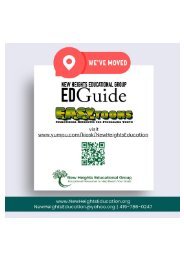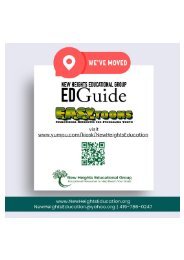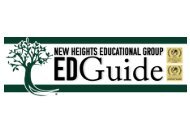NHEG EDGuide Newsletter September 2016
A comprehensive guide to current educational topics, stories and news, along with highlights of the accomplishments, activities and achievements of the New Heights Educational Group. www.NewHeightsEducation.org
A comprehensive guide to current educational topics, stories and news, along with highlights of the accomplishments, activities and achievements of the New Heights Educational Group.
www.NewHeightsEducation.org
You also want an ePaper? Increase the reach of your titles
YUMPU automatically turns print PDFs into web optimized ePapers that Google loves.
1
HIGHLIGHTS<br />
<strong>NHEG</strong> PAGES<br />
Chief Execuve &<br />
Project Director<br />
Pamela Clark<br />
Resources for students and<br />
their families, Best College<br />
Websites review<br />
Page 7<br />
We did it again!<br />
Page 22<br />
Editor<br />
Bill Naugle<br />
Cover Designer<br />
Aisha Marballie<br />
Proof Reader<br />
Jenni Schreiber<br />
The Need to Believe in the<br />
Ability of Disability<br />
Page 27<br />
Nine Tips for Parents If Your<br />
Child Is Changing Schools<br />
Page 41<br />
On The Cover<br />
Our 10th Anniversary cake from<br />
Recognition Day <strong>2016</strong><br />
2<br />
Founder/ Executive Director of<br />
The New Heights Educational Group, Inc.<br />
Resource and Literacy Center<br />
NewHeightsEducation@yahoo.com<br />
www.NewHeightsEducation.org
Goodbye Summer,<br />
The Tans Will Fade, but the Summer<br />
Memories will Last Forever<br />
Hello Fall,<br />
Pumpkins, Football, Warm Sweatshirts.<br />
Apple Cider, Hayrides, Falling Leaves<br />
and Cinnamon.<br />
Hello<br />
3
4
My thoughts are that we have been married for 28 years and he has<br />
believed in <strong>NHEG</strong> way before anyone else, before the recognition started<br />
coming in. He is definitely a silent partner and has helped with a lot of last<br />
minute issues.<br />
ON MY MIND<br />
Pamela Clark<br />
5
Ever Dream of having your own Radio Show ?<br />
New Heights Educational Group is a Resource and Literacy Center based in Defiance,<br />
Ohio. We share a concern with families having access to information for those<br />
with special needs, including Autism.<br />
We offer live internet radio shows to discuss various educational topics and we are<br />
looking for a VOLUNTEER to host a half-hour radio show. We would give the<br />
necessary training and the volunteer can choose the time of the show<br />
on Tuesday, Wednesday, or Saturday. This show would keep all<br />
listeners up-to-date on anything to do with Autism and other special<br />
needs. This will include discoveries in medical fields. Anyone interested<br />
in applying please email us at NewHeightsEducation@yahoo.com<br />
or call 419-786-0247 for more info.<br />
You can learn more about us by visiting our website<br />
www.NewHeightsEducation.org<br />
Please support our library and<br />
satellite office at:<br />
gofundme.com/9z4paprw<br />
6
Resources for students and their families, Best College<br />
Websites review:<br />
All of the websites provided in this assignment are from bestcolleges.com. This is a website that provides<br />
college rankings to inform about what schools across the country have to offer in terms of top-rated academics<br />
and student lifestyle (Bestcolleges).<br />
I have reviewed every link, and they are what they appear to be. The first link shows you top online schools,<br />
the second link provides online associate degree programs, and the third link shows online bachelor’s degree<br />
programs. The fourth link provides a variety of different degrees categorized by state, and the last three links<br />
provide helpful information regarding, online education, how to succeed and how to finance an online degree.<br />
What I picked up from viewing the bestcolleges links is that each link takes you to the exact same page, just a<br />
different section of information. The page provides the best 50 online colleges of <strong>2016</strong>, but after looking<br />
through more of the website you can individually search on your own by selecting a degree, a category and a<br />
subject, and the website will search for schools for you based on your entered selections.<br />
To my understanding to browse the website and research there information is completely free as well as<br />
requesting information from a school, you just have to enter some basic information, such as your name, email<br />
address etc. Overall, the website is very informative. Along with the name of the school they provide an indepth<br />
description of the degree programs that they offer the location/address, out-of-state and in-state tuition<br />
costs and an easy way to view the schools profile.<br />
I would personally use this website because in a sense it helps condense your college/university search for you.<br />
When you are searching for degree programs, it can become a stressful task, because of all the information and<br />
schools to look through. This website allows you to quickly glance at a brief description of the school and there<br />
programs before searching there website. Thus I think that this would be a site worth sharing to others.<br />
http://www.bestcolleges.com/resources/<br />
http://www.bestcolleges.com/features/top-online-schools/<br />
http://www.bestcolleges.com/features/top-online-schools/#accredited-online-associate-degree-programs<br />
http://www.bestcolleges.com/features/top-online-schools/#accredited-online-bachelors-degree-programs<br />
http://www.bestcolleges.com/features/top-online-schools/#online-colleges-by-state<br />
http://www.bestcolleges.com/features/top-online-schools/#why-online-education<br />
http://www.bestcolleges.com/features/top-online-schools/#financing-your-online-degree<br />
http://www.bestcolleges.com/features/top-online-schools/#resources-to-help-you-succeed<br />
7
Join Our Hands-on<br />
History Lesson<br />
During Homeschool Days, students and<br />
their families can enjoy hands-on activities<br />
and revolutionary experiences designed to<br />
make colonial dramas come to life in a way<br />
that is educational and interactive. Plus,<br />
visits can be tailored to make your trip<br />
unforgettable with on-site lodging, 18thcentury<br />
tavern dining, entertainment, and<br />
much more! Inspire the next generation of<br />
dreamers with a Colonial Williamsburg<br />
experience.<br />
Colonial Williamsburg’s Homeschool Days<br />
For more information:<br />
<strong>September</strong> 10-25, <strong>2016</strong><br />
https://www.colonialwilliamsburg.com/plan/groups/homeschoolers/?<br />
utm_medium=email&utm_source=iContact&utm_campaign=HomeschoolApr<strong>2016</strong>&NCK=8885281012<br />
The Revolutionary City invites your group to embark on an 18th-century adventure. Experience a<br />
colonial capital and meet the citizens who helped build a nation. Colonial Williamsburg offers a variety<br />
of ways for groups of all sizes, interests, and ages from kindergarteners to senior citizens, from scouts<br />
to families to explore the 301-acre town, browse our world-class indoor museums, and discover<br />
something new about the creation of America. For more than 70 years Colonial Williamsburg has<br />
provided a premier school field trip destination, offering schools assistance in addressing educational<br />
standards and individually tailoring an experience that fits unique classroom needs. Once your students<br />
step into the Revolutionary City they are fully immersed in 18th-century Virginia’s colonial capital city.<br />
Our interactive programs and cross-curricular investigations will engage students’ minds. They will see<br />
and experience life as the founding families did in the 1700s, and our professional tour guides will<br />
make their learning fun! Choose one of Colonial Williamsburg’s School and Group Tours’ packages or customize your own<br />
group experience with the help of our trained staff.<br />
8
<strong>NHEG</strong>’s Volunteer of the Month program recognizes the dedication and<br />
work of some of our most active volunteers. <strong>NHEG</strong> relies on volunteers to<br />
help with our education programs, our special events, public outreach,<br />
and other activities that help fulfill our mission of supporting literacy for<br />
children and adults by offering a range of educational support services.<br />
Contact us to learn more about volunteering.<br />
This month we recognize a special group of volunteers: those that have<br />
gone above and beyond what is needed in their everyday duties. <strong>NHEG</strong> is<br />
an all-volunteer organization. We have volunteers from all around the<br />
world!<br />
9
10
Dial 347-934-0450 for Priscilena Shearon<br />
Congratulations Briana & Priscilena<br />
Congratulations Briana on sharing her show episodes on<br />
itunes and watchknowlearn.org!<br />
She has had 12,313 views on watchknowlearn and has a<br />
five star rating.<br />
Also congratulations Priscilena on using<br />
watchknowlearn.org. She has 208 views on this site and a<br />
4 star rating.<br />
They are making us look good. :-)<br />
11
To be a volunteer, it takes...<br />
Generosity, a willingness to give<br />
your time to others<br />
Understanding, because their lives might<br />
be very different from your own<br />
Empathy, an ability to put yourself in<br />
someone else's shoes and feel what they<br />
must feel<br />
Compassion, to truly care about making<br />
someone else's life better<br />
Patience, because the process doesn't<br />
always go as smoothly as it might<br />
Dedication, to stick with the project and<br />
see it through<br />
You've shown these qualities and so<br />
much more, so thank you for all that you<br />
do.<br />
Public Service Bulletin Board<br />
Up Coming Holidays<br />
<strong>September</strong> 5 Labor Day <strong>2016</strong><br />
October 10 Columbus Day <strong>2016</strong><br />
October 31 Halloween <strong>2016</strong><br />
November 6 Daylight Saving <strong>2016</strong><br />
November 11 Veterans' Day <strong>2016</strong><br />
November 24 Thanksgiving <strong>2016</strong><br />
12
· 1-1/4 pounds ground beef<br />
· 1 medium onion, chopped<br />
· 4 garlic cloves, minced<br />
· 2 cups salsa<br />
· 1 can (16 ounces) refried beans<br />
· 1 can (15 ounces) black beans, rinsed and drained<br />
· 1 can (10 ounces) enchilada sauce<br />
· 1 can (4 ounces) chopped green chilies<br />
· 1 envelope taco seasoning<br />
· 1/4 teaspoon pepper<br />
· 6 flour tortillas (10 inches)<br />
· 3 cups (12 ounces) shredded Mexican cheese blend, divided<br />
· 2 cups crushed tortilla chips<br />
· Sliced ripe olives, guacamole, chopped tomatoes and sour<br />
cream, optional<br />
1. In a large skillet, cook beef and onion over medium heat until meat is no longer pink. Add garlic; cook 1 minute longer.<br />
Drain. Stir in the salsa, beans, enchilada sauce, chilies, taco seasoning and pepper; heat through.<br />
2. Spread 1 cup meat mixture in a greased 13-in. x 9-in. baking dish. Layer with two tortillas, a third of the remaining meat<br />
mixture and 1 cup cheese. Repeat layers. Top with remaining tortillas and meat mixture.<br />
3. Cover and bake at 375° for 30 minutes. Uncover; sprinkle with remaining cheese and top with tortilla chips.<br />
4. Bake 10-15 minutes longer or until cheese is melted. Let stand for 10 minutes before serving. Garnish with olives,<br />
guacamole,<br />
TOTAL TIME: Prep: 25 min. Bake: 40 min. + standing<br />
YIELD:12 servings<br />
13
We have a huge collection of data regarding various disabilities and how to manage the<br />
education of your kids on various disabilities ranging from Autism and ADHD to<br />
Prader-Willi Syndrome. We have hands-on experience in dealing with kids from<br />
various backgrounds. If you have any questions or information to contribute,<br />
please contact us.<br />
Autism spectrum disorder<br />
ADHD<br />
ALS<br />
Bipolar disease<br />
Cancer<br />
Celiac disease<br />
Cerebral palsy<br />
COPD<br />
Cystic fibrosis<br />
Down syndrome<br />
Driver education<br />
Dyslexia<br />
Disabled persons<br />
Edward's syndrome<br />
Fragile X syndrome<br />
Hearing loss<br />
Irlen syndrome<br />
Neural tube defect<br />
Paralysis<br />
Phenylketonuria<br />
Prader-Willi syndrome<br />
Rett syndrome<br />
Sickle cell disease<br />
Spina bifida<br />
Spinal deformity<br />
Stroke<br />
Tay-Sachs disease<br />
Traumatic brain injury<br />
14
15
Missed a show? Check out past shows here:<br />
http://www.newheightseducation.org/education-talk-radio-nheg<br />
As they explore a new topic on education every week. . .<br />
It is with a heavy heart that we say<br />
goodbye to a long standing a <strong>NHEG</strong><br />
volunteer.<br />
Lisa Schroder started with us<br />
on 10/2/14 as a Proofreader<br />
16
17
18
Help us Reach Our Fund-raising Goals<br />
Please collect the following items and share with <strong>NHEG</strong> to help us reach<br />
our fundraising goals.<br />
TerraCycle<br />
Outsmart Waste<br />
Cell Phone Brigade® E-Waste Brigade® Inkjet Brigade® Laptop Brigade®<br />
DONATE YOUR OLD CAR, BOAT OR RV Make a Car Donation | Make a Difference<br />
Call 1-800-240-0160 and a friendly car donation specialist will schedule your<br />
pick-up appointment.<br />
A public charity 501 (c) (3) non-profit organization<br />
19
http://agrandelife.net/back-to-school-resouces/<br />
http://www.momsandcrafters.com/8-free-back-to<br />
-school-resources/<br />
http://cleverclassroomblog.com/2013/08/back-to-schooltips-and-resources.html<br />
20
21
New Heights Educational Group<br />
HONORED AS SILVER STEVIE® AWARD WINNER<br />
IN <strong>2016</strong> AMERICAN BUSINESS AWARDS<br />
Stevie winners will be presented with their awards on June 20 in New York<br />
Defiance, Ohio – May 2, <strong>2016</strong> – The New Heights Educational Group was named<br />
the winner of a Silver Stevie® Award in the Organization of the Year - Non-Profit<br />
or Government category in The 14th Annual American Business Awards today.<br />
The American Business Awards are the nation’s premier business awards<br />
program. All organizations operating in the U.S.A. are eligible to submit<br />
nominations – public and private, for-profit and non-profit, large and small.<br />
Nicknamed the Stevies for the Greek word meaning “crowned,” the awards will<br />
be presented to winners at a gala ceremony at the Marriott Marquis Hotel in New<br />
York on Monday, June 20. Tickets are now on sale. More than 3,400 nominations<br />
from organizations of all sizes and in virtually every industry were submitted this<br />
year for consideration in a wide range of categories, including Startup of the Year,<br />
Executive of the Year, Best New Product or Service of the Year, Marketing<br />
Campaign of the Year, Live Event of the Year, and App of the Year, among<br />
others. The New Heights Educational Group was nominated in the Organization<br />
of the Year - Non-Profit or Government. Pamela Clark, Executive Director, said,<br />
“We are truly honored to receive recognition from the Stevie Awards, which they<br />
have done for the last four years. We will treasure this year’s ABA award for<br />
years to come, and appreciate them recognizing our team of over 80 volunteers<br />
and our work. We work hard to better education in our community as well as<br />
nationally, and in bringing opportunities to all families regardless of school choice<br />
or beliefs. Some of the judges’ comments can be seen below:<br />
“Excellent company filling a need in the educational industry”<br />
“Nice job, New Heights Educational Group.”<br />
“Sounds like a nice organization with a solid cause.”<br />
A public charity 501 (c) (3) non-profit organization<br />
“Literacy and leadership programs have <strong>NHEG</strong> addressing student development at<br />
the earliest stages.”<br />
More than 250 professionals worldwide participated in the Judging<br />
process to select this year’s Stevie Award winner.<br />
22
23
Believe in Yourself<br />
A Manifesto for Youth<br />
by Marilyn Price-Mitchell,<br />
Coaches often utter the words “believe in yourself” to young people struggling with self-confidence. But<br />
what does it mean to believe in yourself? And why is it so important to the development of healthy and<br />
successful youth?<br />
No one in the world of psychology is better known for the study of what these words mean than former<br />
Stanford professorAlbert Bandura.<br />
Psychologists refer to the concept of self-belief as self-efficacy and define it as a belief in one’s capability to<br />
accomplish goals that influence the events in one’s life. In other words, when you believe in yourself, you are<br />
better able to follow your dreams!<br />
Learning to believe in yourself is at the core of The Compass Advantage—a framework for understanding how<br />
children and teens learn to chart their own paths toward young adulthood and throughout life.<br />
According to Bandura, self-efficacy is a determining factor in how we feel, think, behave, and motivate<br />
ourselves in the world. He maintained that when you believe in yourself, you take positive actions on your<br />
own behalf and approach life as a challenge to be mastered.<br />
In my interviews with young people over the years, it’s no surprise to discover that, deep down, what they<br />
most want is to believe in themselves—in their own inner compasses.<br />
I Have a Dream: What it means to “Believe in<br />
Yourself”<br />
From the outside, our children are very different from one another. They have diverse backgrounds, interests,<br />
capabilities, and career aspirations. But if we look deeper—to a young person’s internal world—they have<br />
much more in common.<br />
The following statement, backed by years of<br />
research on self-efficacy, was co-written with teens<br />
from the Bainbridge Healthy Youth Alliance. It is<br />
designed to be used as a resource for families,<br />
schools, and communities—to discuss children’s<br />
hopes and dreams and the types of adult support<br />
that most benefits kids on their journeys toward<br />
adulthood. What does it mean to believe in<br />
yourself? Teens helped come up with beautiful<br />
words!<br />
24
<strong>NHEG</strong> Organizational Chart<br />
25
The Need to Believe in the Ability of Disability<br />
Scott Barry Kaufman Scientific Director, The Imagination Institute<br />
Our society has clear expectaons regarding students who don’t fit the norm. In a 2004 naonal survey<br />
reported in Educaon Week, 84 percent of 800 surveyed special and general educaon teachers did not<br />
believe that students in special educaon should be expected to meet the same set of academic standards<br />
arculated for students without disabilies. These beliefs are important, as they guide policies that either<br />
encourage or hinder students with disabilies from receiving the same opportunies to flourish as everyone<br />
else.<br />
The diversity among those receiving disability-related educaonal services is enormous. But regardless of this<br />
diversity, the majority of these students oen share one common experience: their classificaon involves the<br />
use of an IQ test. To be sure, even the harshest crics of IQ tesng acknowledge that IQ scores are related to<br />
academic achievement. On average, IQ test scores account for 40 to 50 percent of academic achievement —<br />
which is very high in psychological and educaonal research. This also means that 50 to 60 percent of student<br />
achievement is related to within-child factors beyond IQ, such as specific abilies, creavity, grit, movaon,<br />
emoonal and cognive self-regulaon, passion and inspiraon, as well as external variables such as<br />
community, school, and instruconal characteriscs.<br />
Unfortunately, all too oen educaonal policies and systems reward those with a high IQ, and limit those<br />
who, for a number of potenal reasons, don’t perform well on IQ tests. Many believe that a person’s<br />
intelligence is a genecally determined, largely fixed, global, and enduring trait that explains most of a<br />
student’s success or failure in school. The reality is this: intelligence is not fixed, it takes many different forms,<br />
and IQ test scores are not sufficient metrics by which to form accurate expectaons about any<br />
parcular individual’s likelihood of future academic success. They can only provide a range of possible levels of<br />
expected achievement.<br />
This is captured in a measurement stasc called the Standard Error of the Esmate. As reported in a<br />
2004 Naonal Center on Educaonal Outcomes (NCEO) report, for any given IQ test score, half of the<br />
students will aain standardized achievement test scores below or equal to their IQ score. Equally important,<br />
and frequently unrecognized — for any IQ test score, half of the students will obtain achievement scores at<br />
or above their IQ score. This holds at all levels of intelligence. So what ps the scale of achievement one<br />
direcon or the other for different students?<br />
26<br />
(Continued on Next Page)
The Need to Believe in the Ability of Disability<br />
(Continued from Previous Page)<br />
We believe that expectaons play a much larger role than most people realize. Educaonal psychology<br />
research first labeled this as the “Pygmalion Effect.” More recently Elisha Babad found that teachers’<br />
expectaons can have systemac effects on their grading, as well as students’ performance on standardized<br />
achievement tests. Similarly, Kathleen Coon reported that teacher expectaons affect students’ achievement<br />
and atudes, including offering fewer opportunies to learn new material, insincere praise, providing less<br />
smulang and lower-level cognive quesons, and providing less effecve but me consuming instruconal<br />
methods. Peer expectaons also play an important role, as children with disabilies are very sensive to the<br />
overt and covert signals they are receiving from their friends.<br />
Despite a teacher’s best effort to suppress their expectaons, communicaon “leakage” oen sll comes<br />
through loud and clear. Jan Pieter Van Oudenhoven and Frans Siero reported that even though teachers gave<br />
students thought to be learning disabled twice as much verbal praise, they also displayed more negave<br />
nonverbal feedback such as discouraging head movements. Implicit signals can have a big impact on<br />
intellectual performance, and this is reflected in the brain. In a recent study, Kenneth Kishida and his<br />
colleagues had people take an IQ test alone and then in a group seng. In the group situaon, the<br />
parcipants received their score and were told their rank in the group. In this situaon, in which implicit<br />
signals of social status were broadcast to everyone in the group, everyone performed worse. Those who<br />
suffered the most though were those who were told they were the “low performers.” Not only was their IQ<br />
score lower than their earlier performance, but they also showed brain changes in areas associated with fear<br />
and working memory (amygdala, dorsolateral prefrontal cortex, and nucleus accumbens) suggesng that such<br />
lowered expectaons brought about anxiety which prevented them from showing their true colors. Low<br />
expectaons literally shut down their brain.<br />
Just how prevalent are expectancy effects? Researchers have reported that of all students treated with high<br />
expectaons, about 10 percent demonstrated substanal improvement. Any other large-scale social program<br />
that could move 10 percent of the below average students into higher achievement levels would be heralded<br />
as a success. Examples of social policy decisions that have been made based on roughly the same strength<br />
include the reducon of the risk of dying from a heart aack by taking aspirin and the impact of chemotherapy<br />
on breast cancer survival.<br />
27<br />
(Continued on Next Page)
The Need to Believe in the Ability of Disability<br />
(Continued from Previous Page)<br />
We acknowledge that expectancy effects<br />
will vary by individuals and<br />
some children with severe disabilies need alternave strategies to meet goals and standards. But many<br />
children with disabilies are being denied the right to appropriate and demanding expectaons. Stereotyping<br />
students with disabilies on the basis of a disability label or standardized test score is not supported by the best<br />
evidence from the field of psychological and educaonal measurement.<br />
Since educaonal policies are part of the current presidenal discourse, we believe it is crucial that local, state<br />
and naonal achievement goals not be at the expense of the educaon of students with disabilies. Many socalled<br />
“disabilies” can be strengths in the right context, and many people with disabilies have a wide array of<br />
abilies. Less focus on “how smart is this child” to “how is this child smart” is a movement in the right direcon<br />
that recognizes the only proven law in psychology — the law of individual differences (i.e., there is no one-sizefits<br />
all learning method). All children have a need — a need to achieve. The bigotry, or blindtessm of having<br />
low expectaons for individual students with disabilies or unique needs must be recognized, understood, and<br />
minimized, if all children are not to be le behind and the diversity of our naons brain power is to be<br />
increased to compete in the new global economy.<br />
28
29
30
A few years ago, a 19-year-old girl named Jolene walked into a Boston emergency room late at night. She had an infection after a botched ear piercing.<br />
When the doctors and nurses examined her, they asked Jolene if she felt safe at home. She said yes.<br />
What the doctors didn’t know was that she had been dropped off at the hospital by her trafficker, who was forcing her to sell sex up and down the<br />
northeast.<br />
Jolene’s story is real. Although she did not escape her trafficking situation that night, she eventually did—and today, she is an advisor on human<br />
trafficking for Massachusetts General Hospital.<br />
Healthcare professionals are uniquely positioned to be able to interact with trafficking victims. In one study, 88% of the sex trafficking survivors surveyed<br />
reported having contact with a healthcare provider while being trafficked.<br />
Yet as Jolene’s story shows, sometimes healthcare professionals don’t recognize the signs of human trafficking. In another study, 95% of ER doctors and<br />
nurses surveyed had never received formal training on human trafficking.<br />
A few weeks ago, the House of Representatives introduced a bill that would improve current human trafficking trainings for healthcare workers, as well<br />
as ensure that more workers receive the training. Since its introduction, more and more members of Congress have signed on to it.<br />
Will you join us and call on Congress to pass this critical legislation?<br />
Take Action Now!<br />
It’s vital that our doctors and nurses are adequately trained to identify and support victims of human trafficking. Trafficking victims should receive<br />
health care that is tailored to their needs.<br />
We hope you are proud of the critical role you play in combating human trafficking. And we recently received news to make you even more proud! For<br />
the sixth consecutive year, the independent nonprofit evaluator Charity Navigator awarded Polaris a four star rating for sound fiscal management,<br />
accountability, and transparency. Only 4% of the charities rated have received this exceptional distinction for six years.<br />
We couldn’t have achieved this without you. Thank you for your willingness to stand with us in this fight. Let’s keep it going.<br />
31
<strong>NHEG</strong> has the opportunity to win some classroom supplies.<br />
Please vote for us!<br />
https://www.educents.com/wishlist/index/index/wishlist_id/26794/<br />
This is our referral link. http://www.educents.com/signup-bonus.html?r=270976<br />
We will receive $10.00 in Edubucks credit once someone uses this URL to create an account and<br />
make a purchase of $25 or more on our site.<br />
Help us save even more on educational products!<br />
Congratulations Khrista-Cheryl Cendana<br />
The New Heights Educational Group is recognizing Khrista-Cheryl Cendana from Riverside,<br />
California for her volunteer service. She has been a volunteer with <strong>NHEG</strong> since January 15, 2015 and<br />
has donated over 100 hours. She is further receiving the Presidential Volunteer Service Bronze<br />
Award.<br />
Pamela Clark, Founder, Executive Director of the organization stated, “It is quite an achievement,”<br />
“Ms. Cendana has been a valuable asset to our organization and has shown a great work ethic.”<br />
The <strong>NHEG</strong> currently has over 75 volunteers from around the world and has been recognized<br />
nationally and internationally for its work.<br />
32
1 National Cherry Popover<br />
Day<br />
2 VJ Day, WWII<br />
3 Skyscraper Day<br />
4 Newspaper Carrier Day<br />
5 Labor Day<br />
6 Read a Book Day<br />
7 National Salami Day<br />
8 International Literacy Day<br />
9 Teddy Bear Day<br />
10 Swap Ideas Day<br />
11 911 Remembrance<br />
12 Chocolate Milk Shake Day<br />
13 Uncle Sam Day<br />
14 National Cream-Filled Donut Day<br />
15 Felt Hat Day<br />
16 American Legion Day<br />
17 Constitution Day<br />
18 National Cheeseburger Day<br />
19 International Talk Like A Pirate Day<br />
20 National Punch Day<br />
21 International Peace Day<br />
22 Autumn Equinox<br />
23 Native American Day<br />
24 National Cherries Jubilee Day<br />
25 National Comic Book Day<br />
26 Johnny Appleseed Day<br />
27 Oktoberfest begins in Germany<br />
28 Ask a Stupid Question Day<br />
29 Confucius Day<br />
33<br />
<strong>September</strong> Celebrations<br />
Monthly:<br />
<strong>NHEG</strong><br />
Weekly Celebrations:<br />
· National Payroll Week: (First Week)/<br />
· Substitute Teacher Appreciation Week:<br />
· (First Full Week)<br />
· Suicide Prevention Week: 5-11<br />
· National Days of Prayer & Remembrance: 9-11<br />
· National Truck Driver Appreciation Week: 11-17<br />
· International Housekeepers Week: 11-17<br />
· (Second Full Week)<br />
· Constitution Week: (Third Full Week)<br />
· Classical Music Month<br />
· Hispanic Heritage Month<br />
· Fall Hat Month<br />
· International Square Dancing Month<br />
· National Blueberry Popsicle Month<br />
· National Courtesy Month<br />
· National Piano Month<br />
· Chicken Month<br />
· Baby Safety Month<br />
· Little League Month<br />
· Honey Month<br />
<strong>NHEG</strong><br />
<strong>NHEG</strong><br />
· Self Improvement Month<br />
· Better Breakfast Month<br />
<strong>NHEG</strong>
<strong>2016</strong>-2017 IN-THEATRE EDUCATION SERVICE<br />
AGREEMENT<br />
The Nutcracker – Tues, Dec 6 – 10am<br />
The Nutcracker – Thurs, Dec 8 – 10am<br />
The Nutcracker – Thurs, Dec 8 – 12:30pm<br />
The Nutcracker – Fri, Dec 9 – 10am<br />
Swan Lake – Fri, March 17 – 10am<br />
Reservation Form<br />
Click to print.<br />
34
Ingredients<br />
· 1/2 package sandwich cookies (12 to 14 cookies) ,<br />
crushed<br />
· 15 regular-size peanut butter cups, crushed<br />
· 10 ounces candy-coated chocolate pieces<br />
(about 1 cup), crushed<br />
· 1/2 gallon very good quality vanilla ice cream,<br />
slightly softened<br />
Special equipment: Fifteen 5-ounce paper cups<br />
Directions<br />
· Combine the crushed cookies, peanut butter cups and candy-coated chocolate pieces and add a spoonful to<br />
the bottom of each paper cup.<br />
· Scoop the ice cream into a large bowl of a mixer, then pour in the remaining chocolate-cookie mix. Mix<br />
gently with a paddle attachment. Spoon the ice cream into the cups and carefully insert a popsicle stick into<br />
each pop.<br />
· Freeze until the ice cream has solidified. Tear off the paper cups to serve.<br />
2012 Ree Drummond All Rights Reserved<br />
Total Time: 2 hr. 10 min<br />
Prep: 10 min<br />
Inactive:<br />
2 hr.<br />
35<br />
Yield:15 servings<br />
Level: Easy
10th<br />
36
37
Parents & Teachers: 6 Ways to Inspire the Teen<br />
Brain<br />
The teen brain is at a crossroad; unlock its potential with 6 strategies.<br />
The teen brain is in a vulnerable state. It is primed to fall into addiction, delve deeply into depression and<br />
seek out risky situations. However, the teen years are also a prime time for developing long-term,<br />
necessary strategic thinking skills, the foundation for advanced reasoning that should continue to be<br />
refined in complexity and maturity throughout adulthood.<br />
The brain undergoes more change during the teenage years than any other time except for the first two<br />
months of life. The changes are most dramatic in the frontal lobe networks, the brain’s command control<br />
center. The frontal lobe networks are responsible for reasoning, planning, decision-making, judgment,<br />
inhibiting bad choices, and other high-level cognitive functions. Providing necessary challenges to support<br />
development of the frontal lobe networks is key to your teen’s ability to achieve future life success.<br />
For years parents and educators have preached, “the more you know, the better.” Teens are being trained<br />
to stuff facts and regurgitate information, leading to rote memorization and stymied creativity. Such robotic<br />
use of the brain is leaving the teen brain uninspired. A time of extraordinary promise and susceptibility,<br />
this vital adolescent brain stage merits larger-than-life attention from parents and teachers. The teen brain<br />
is primed to create and innovate new ideas.<br />
Elevating brainpower during this impressionable life stage of adolescents is imperative to promoting<br />
independent life success. Follow the below tips to inspire the best and brightest brain performance and to<br />
enhance vital frontal lobe development of your teenager.<br />
38
Parents & Teachers: 6 Ways to Inspire the Teen<br />
Brain (Connued)<br />
à<br />
à<br />
à<br />
à<br />
à<br />
à<br />
Teach your teen to conceive many unique interpretations of movies, books, political discussions,<br />
unsettling school or peer issues, or works of art.<br />
Encourage your youth to be a problem finder and solution setter for issues that arise daily and discuss<br />
how academic content supports this expertise.<br />
Ask your teenager to give you a “message” from a book or movie or hurtful experience rather than a<br />
long-winded retell without reflection.<br />
Have your adolescent interpret the lyrics of their favorite song from positive and negative perspectives<br />
and do the same for your song with them.<br />
Watch their favorite TV show with them and share different take-home messages for the different<br />
characters.<br />
Push for a multitude of answers to a question or problem versus seeking the “right” answer.<br />
Our brains are wired to be inspired – especially during teen years. Fostering creativity and innovation to<br />
tackle difficult and multifaceted problems – in and out of school – will drive successful futures of our youth<br />
for generations to come. As Einstein once said, “Imagination is more important than knowledge.<br />
Knowledge is limited. Imagination encircles the world.”<br />
39
Are you sharing our newest monthly Magazine and would like to be<br />
added to our Magazine mailing list……….<br />
Drop us an Email to: <strong>Newsletter</strong>@newheightseducation.org<br />
40
9 Tips for Parents If Your Child is<br />
Changing Schools<br />
My last article discussed my reactions about our recent move. I’m happy to report we are settling into our new home, and I<br />
thank everyone for all of the good wishes. The anxiety I experienced as an adult made me think of all of the children who<br />
may be changing schools come <strong>September</strong>. Whether your family is moving — or your child is changing schools for any<br />
number of other reasons — there are steps you can take now to ease the transition for your child.<br />
Whatever the age of your child, it’s a good idea to arrange a visit to the new school. Although school is not in session over<br />
the summer, a visit will demystify the new school environment by enabling your child to see the physical building, including<br />
classrooms, playground, and cafeteria. The principal may be around, and as the school year approaches, teachers may be<br />
at the school setting up their classrooms. Meeting some of the school personnel will familiarize your child with the new cast<br />
of characters in his or her life.<br />
There are also many excellent children’s books for young children that deal with school, such as Curious George Goes to<br />
School by Margret Rey, and The Berenstain Bears Go to School by Jan and Stan Berenstain. My all time favorite book for<br />
children and adults of all ages is Oh, the Places You’ll Go by Dr. Seuss. It inspires kids of all ages to be bold and<br />
courageous in new situations.<br />
Here are some tips to help you and your child become comfortable in the new school.<br />
1. It is normal for both you and your child to be anxious about entering a new school, but if<br />
you have concerns, please don’t express them to your child. Express confidence and<br />
optimism about his/her ability to meet the new challenges.<br />
2. Look for opportunities for your child to meet his/her classmates over the summer. Check<br />
with the school principal, PTA, religious and social organizations and other groups to find<br />
connections.<br />
3. If your child has special needs, such as a learning disability or food allergy, work with the new school as far in advance<br />
as possible to determine placement and to line up services and support.<br />
4. Keep the spark of learning alive during the summer. Students can lose from one to three months of learning during the<br />
summer, so plan to keep your child engaged by encouraging reading, word games, math and nature activities. Simply<br />
cooking and baking with kids can help develop math, reading, and science skills.<br />
41<br />
(Continued on next page)
9 Tips for Parents If Your Child is<br />
Changing Schools<br />
(Continued from previous page)<br />
5. Call the PTA or PTO president and introduce yourself. Parent organization leaders are in a good position to share<br />
information and issues about the new school with you. Ask how you can contribute your skills and interests. Getting actively<br />
involved in your child’s new school benefits you and your child! Research indicates that the more involved parents are, the<br />
more successful their own children will be.<br />
6. Know the names, phone numbers, and e-mail addresses of your children’s teachers, principal, and school nurse. By all<br />
means, contact them if you have questions or concerns.<br />
7. Become familiar with your school and school district websites, and check them for calendar changes, meeting<br />
announcements and minutes, news, policies and procedures, and other information.<br />
8. Check your mail for the publication of the annual calendar/directory. Keep it in an accessible place.<br />
9. Find out how your school communicates important information to parents and then be alert to those messages. Is it by<br />
automated phone message, e-mail blasts, electronically through systems such as Parent Portal, newsletters, snail-mail, or in<br />
your kids’ backpacks?<br />
Staying on top of information and issues will enable you to be a proactive and informed parent. Your ongoing engagement,<br />
support, and encouragement will expedite your child’s transition into the new school.<br />
It’s Always Sad to Say Goodbye!<br />
It’s always sad to say goodbye to one of our<br />
associates. Yaminee Patel our radio monitor for the<br />
last 11 Months has decided to leave us. She will be<br />
starng college soon. We will miss her, but she may<br />
rejoin our team in the future.<br />
42
43
On Sunday, July 3, <strong>2016</strong> 9:26 PM, Yaminee Patel wrote:<br />
This was a great topic that many people may not think about unless they know<br />
someone learning English as a second language. It is a great discussion to start.<br />
You brought up great arguments and posed great questions. I think it would be<br />
interesting to revisit this topic with a student who went through the ESL program<br />
to see how they felt about it. You did great this week; the content and audio<br />
quality were fantastic. Have a good 4th of July weekend!<br />
44
45
Anthony Walton<br />
Missing Since: Dec 13,<br />
2015<br />
Missing From: Dayton, OH<br />
DOB:Feb 11, 2001<br />
Age Now:15<br />
Sex:Male<br />
Race: Black<br />
Eye Color: Brown<br />
Height:5'6"<br />
Weight:120 lbs.<br />
Missing<br />
Have You<br />
Seen<br />
These<br />
Children?<br />
Missing<br />
Kaley Alstork<br />
Missing Since: Mar 14, <strong>2016</strong><br />
Missing From: Dayton, OH<br />
DOB: Dec 24, 2000<br />
Age Now:15<br />
Sex:Female<br />
Race: Black<br />
Kaley was last seen on March<br />
14, <strong>2016</strong>. She may be in the<br />
company of other juvenile females.<br />
They may still be in the local area.<br />
46
We received permission from Hillsdale College in Michigan<br />
to share their courses on our website. Each link offers a<br />
group of classes.<br />
Some of the non-credit courses being offered:<br />
Course Catalog<br />
· An Introducon to C.S. Lewis: Wrings and Significance<br />
· Winston Churchill and Statesmanship<br />
· The Federalist Papers<br />
· A Proper Understanding of K-12 Educaon: Theory and Pracce<br />
· The Presidency and the Constuon<br />
· Great Books 102: Renaissance to Modern<br />
· Constuon 101: The Meaning & History of the Constuon<br />
· Great Books 101: Ancient to Medieval<br />
· Economics 101: The Principles of Free Market Economics<br />
· History 102: American Heritage, From Colonial Selement to the Reagan Revoluon<br />
· History 101: Western Heritage, From the Book of Genesis to John Locke<br />
· Other Lectures and Programs<br />
· Hillsdale Dialogues: A Survey of Great Books, Great Men, and Great Ideas<br />
Kirby Center Lectures Archive<br />
47
48
The Heart of Teaching: What It<br />
Means to Be a Great Teacher<br />
What does it mean to be a great teacher? Of course credentials,<br />
knowledge, critical thinking, and all other faculties of intelligence<br />
are important. However, a great teacher should be much more<br />
than credentials, experience and intelligence.<br />
What lies in the heart of a great teacher?<br />
You are kind: a great teacher shows kindness to students,<br />
colleagues, parents and those around her/him. My favorite<br />
saying is “kindness makes the world go around”. It truly changes<br />
the environment in the classroom and school. Being a kind<br />
teacher helps students feel welcomed, cared for and loved.<br />
You are compassionate: Teaching is a very humanistic<br />
profession, and compassion is the utmost feeling of<br />
understanding, and showing others you are concerned about<br />
them. A compassionate teacher models that characteristic to the<br />
students with her/his actions, and as a result students will be<br />
more open to understanding the world around them.<br />
You are empathetic: Empathy is such an important trait to have<br />
and to try to develop in ourselves and our students. Being able to<br />
put yourself in someone’s shoes and see things from their<br />
perspective can have such a powerful impact on your decisions<br />
and actions.<br />
You are positive: Being a positive person is not an easy task.<br />
Being a positive teacher is even harder when we’re always met<br />
with problems with very limited solutions. However, staying<br />
positive when it’s tough can have such a tremendous positive<br />
impact on the students and everyone around us. Looking on the<br />
bright side always seems to help make things better.<br />
You are a builder: A great teacher bridges gaps and builds<br />
relationships, friendships, and a community. Teachers always<br />
look to make things better and improve things inside and outside<br />
of the classroom. Building a community is something a great<br />
teacher seeks to do in the classroom and extends that to the<br />
entire school and its community.<br />
You inspire: Everyone looks at a great teacher and they want to<br />
be a better teacher, they want to be a better student, even better,<br />
they want to be a better person. A great teacher uncovers hidden<br />
treasures, possibilities and magic right before everyone’s eyes.<br />
49
The 5 C’s of Effective Discipline: Setting Rules for<br />
Children<br />
By Ben Martin, Psy.D.<br />
People don’t just stumble upon good parenting. Parenting well, like any other skill in life, is something<br />
we learn not just through what we were taught when we were growing up, but by expanding our<br />
strengths and skills when we become parents ourselves.<br />
Instilling a sense of discipline in children is something few parents feel very comfortable doing. “I just<br />
want them to have fun and be kids!” the guilty parent says. But discipline, whether you like it or not, is<br />
the cornerstone for understanding values and responsibility — things all kids will need to learn sooner<br />
or later.<br />
Effective discipline comes from the following five C’s. Get these right, and you’ll have far less problems<br />
with your kids as they age, as they’ve learned the rules and what breaking them means.<br />
1. CLARITY: Be clear when you set rights, rules and limits.<br />
· Don’t assume your children know family rules until you’ve talked about them.<br />
· Be sure your children understand why these rules are being made and the consequences for<br />
breaking the rules.<br />
· Involve your children as much as possible in making the rules.<br />
Try writing out your family rules and posting them on the refrigerator.<br />
2. CONSISTENCY: Be consistent in enforcing rules.<br />
· Stick to the consequence that has been established for a broken rule.<br />
· Discipline will be more effective if your children have been involved in establishing the rules.<br />
· If a change needs to be made in a family rule, talk about it before the rule is broken.<br />
Be flexible — as your children grow, they’re ready for expanded rights and changes in rules and limits.<br />
3. COMMUNICATION: Talk about rights, rules and limits often.<br />
· Be willing to discuss the fairness of a rule and the reasons for it.<br />
· Help your children learn to talk with you about feelings.<br />
· Encourage your children to come to you when they need help.<br />
Express respect and faith in your child through your words, gestures and tone of voice.<br />
4. CARING: Use encouragement and support, not just discipline for broken rules.<br />
· Praise your children when they follow your family rules, especially when they do what’s expected of<br />
them without reminders from you.<br />
· When a rule is broken, criticize the action and not your children.<br />
· Follow up swiftly when a rule is broken; stay calm and carry out the<br />
consequences your children expect.<br />
· Make sure the consequences are appropriate for the broken rule.<br />
Respect your children’s rights, such as the right to privacy.<br />
5. CREATE: Instill a sense of social responsibility in your children.<br />
· Let your children know you expect moral behavior, like honesty and<br />
fairness.<br />
· Set an example of honesty, fairness and social responsibility for your<br />
children to follow.<br />
· Promote your child’s sense of self-respect.<br />
50
Happy 18th Birthday: No Check for You!<br />
Families in two states were able to extend child support for their 18-year-old students thanks to<br />
guidance from HSLDA.<br />
DARREN JONES<br />
HSLDA litigation attorney<br />
In Texas, the child support enforcement agency refused to continue child support for a homeschooling<br />
member family’s children past their 18th birthdays. Even when confronted with a judge’s order, the<br />
agency kept telling the mother that her children were ineligible for the payments because the students’<br />
curriculum was self-paced, and thus they did not have an expected graduation date.<br />
The family contacted Home School Legal Defense Association. We reviewed the documents and<br />
recommended that the mother explain that she was the administrator of her homeschool program and<br />
certify her children’s graduation dates. Following our advice, the Texas mother explained state law to<br />
the agency, asserted that she was the school official, and stated her children’s expected graduation<br />
dates. The agency, which had previously stalled for four months, immediately approved the payments.<br />
In the Golden State<br />
On the West Coast, a member family from Burbank, California, had a similar issue. The family had been<br />
receiving child support payments for their daughter, who was eligible for continued payments until she<br />
graduated from high school. Before their daughter’s 18th birthday, the family received a form to certify<br />
that the she was still enrolled in high school. However, the form had no provision for the fact that the<br />
student was enrolled in a home-based private school program.<br />
When the family contacted HSLDA, we recommended that they submit their private school affidavit<br />
along with the form they had received. Normally, when the state, school district, or other agency<br />
regulates homeschooling, HSLDA does not recommend voluntarily giving more information about a<br />
homeschool program than what is required by law. However, in cases in which an official needs<br />
information about a homeschool program in order to provide a benefit to the family—in this case, to<br />
continue child support payments—showing such documents to the agency will not jeopardize the legal<br />
standing of the homeschool program.<br />
Shortly after the submitting the form, the grateful member family contacted us to say that the agency<br />
had continued the child support payments.<br />
HSLDA is happy to support our members with advocacy and court representation, but many times, a<br />
simple directive from our experienced legal team is enough to resolve the situation.<br />
51
Practical School Lunch Ideas<br />
Cold and Hot Lunch Ideas<br />
Here are some great (easy) ideas for cold and hot school lunches your kids will actually eat and you'll feel good<br />
about.<br />
Author: Natasha<br />
Skill Level: Easy<br />
Cost To Make: Varies<br />
Ingredients<br />
Start with the drink:<br />
Milk: my son's drink of choice so I always make sure he has milk for lunch.<br />
Juice : select a juice box that has reduced sugar and real fruit juice<br />
School Lunch Main Course (Grains & Meats):<br />
DIY "lunchables": crackers, deli turkey or salami, sliced cheese<br />
Sandwich or sandwich kabobs<br />
Mini bagels and cream cheese<br />
Easy chicken sliders (canned chicken - drained well and mixed with mayo and black pepper to taste, place filling<br />
between leuce and cheese to keep the bun from geng soggy)<br />
Torlla pinwheels (cream cheese, sliced cheese, deli turkey, thinly sliced tomatoes, shredded leuce or spinach -<br />
roll ghtly and slice into rounds)<br />
School Lunch Fruit:<br />
Small banana<br />
Grapes<br />
Blueberries, strawberries or other berries<br />
Fruit kabobs - (click for recipe)<br />
Apricot, apple,.. whatever your kids love<br />
Applesauce<br />
Peeled clemennes<br />
52<br />
(Continued Next Page)
Practical School Lunch Ideas<br />
Cold and Hot Lunch Ideas (Connued)<br />
School Lunch Veggies:<br />
Baby carrots with ranch in mini cups<br />
Cucumber slices<br />
Snap peas<br />
Salad<br />
Avocado slices<br />
School Lunch Snacks and Treats:<br />
Banana bread<br />
Yogurt, Pudding<br />
String cheese<br />
Pretzels, or gold fish crackers<br />
Fruit snacks or fruit leather<br />
Dried fruit<br />
Z-Bar<br />
Muffin<br />
Chocolate chip cookie<br />
DIY trail mix<br />
Instrucons<br />
Hot Lunch Ideas (with a Thermos):<br />
Pasta (try: chicken alfredo, spaghe with shrimp)<br />
Pilaf/rice, or sr fry (try: creamy chicken and rice, shrimp fried rice)<br />
53<br />
Tips for using a thermos:<br />
Pack hot thermos in the morning (5 hours before it's<br />
eaten)<br />
Heat the thermos first: add boiling water, cover and let<br />
sit 5 min then drain. Heat food unl it's hot. Place into<br />
heated thermos and close ghtly with lid. Food will be<br />
warm at lunchme.<br />
What to put in a hot lunch thermos:<br />
Soup (try: chicken noodle soup or meatball soup)<br />
Leovers! You can really get creave with a thermos. Avoid foods with strong aromas (i.e. broccoli and cabbage)
On Wednesday, June 15, <strong>2016</strong> 9:13 PM, Yaminee Patel wrote:<br />
Once again, a fantasc topic! Many aspects of the SAT have changed this year.<br />
Good job breaking down the new changes! I also love that you refereed back to<br />
you past videos on the SAT and ACT, that is a good way to get listeners to go back<br />
and listen to past shows. Nice job adding your own experiences with SAT books<br />
and websites. I wish that I had listened to a show like this to understand the basis<br />
of the test and how to prepare for it! One minor thing that I keep forgeng to<br />
menon-the introducon music is very loud in comparison to when you begin to<br />
speak. If you are able to, try to even out the audio levels between the two. Lastly, I<br />
LOVE that you include links to your sources. It makes everything very easily<br />
accessible and navigable. Great Job!<br />
On Wed, Jun 15, <strong>2016</strong> at 8:52 PM, Yaminee Patel<br />
wrote:<br />
School lunches are a great topic of discussion. They seem to always be a complaint<br />
among students. I love that you broke down the requirements of school lunches, it<br />
gives people perspective on legally mandated regulations. I love that you bring in<br />
research done by students and how they feel about lunch. It is very important to<br />
take children opinions. You also touched on kids who are not eating lunch which<br />
was done very nicely. This show really shines a light on what the bottom line of<br />
school lunch is: to provide healthy lunches to the students. You also made good<br />
points on sugar and self control. The audio was great here and the response time<br />
between the two of you was much better than in past shows. Keep up the good<br />
work!<br />
54
55
A special thank you to everyone who attended<br />
our 10th Anniversary Celebration.<br />
Special thanks to Taco Bell of Defiance, for the<br />
donation of six $5 gift certificates.<br />
Special thanks to Family Video of Defiance for<br />
the donation of $5 gift card. These were raffled<br />
off during the ceremony.<br />
Special thanks Civic Theatre of Fort Wayne for<br />
sending Maggie Clifton and Adam Fletcher to<br />
our 10th Annual Recognition Day Celebration.<br />
They put on a wonderful presentation on set<br />
with design and costumes.<br />
Anurakta Nayak<br />
6/1/16<br />
Website Administrator<br />
Aditi Chopra<br />
6/6/16<br />
Proofreader/Editor<br />
Website Administrator<br />
Social Media Helper<br />
Guidestar Account Manager<br />
Enjoli Baker<br />
6/23/16<br />
Research Coordinator<br />
Online Class Monitor<br />
Beth Barger<br />
8/8/16<br />
Clerical Support (docs)<br />
Kaden Behan<br />
6/25/16<br />
Radio Host<br />
Website Administrator<br />
Writer/Articles<br />
Research Coordinator<br />
Philip Vino<br />
6/28/16<br />
Cartoonist and Graphic Editor/<br />
Photographer<br />
Savleen Grewal<br />
7/1/16<br />
Part-time Teacher/Tutor – Math<br />
6 th Grade<br />
Jennifer Schreiber<br />
8/19/16<br />
Proofreader/Editor<br />
56
57
Interested in Volunteering?<br />
hp://www.volunteermatch.org/<br />
search/org100190.jsp<br />
or<br />
hp://www.chrisanvolunteering.org/<br />
org/new-heights-educaonal-groupinc.jsp#fq=content_type:opportunity&f<br />
q=org_nid:433070<br />
Contact our HR Department<br />
at HR@NewHeightsEducaon.org<br />
58


















